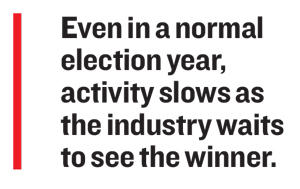If there’s one thing investors don’t like, it’s uncertainty.
Unfortunately, that’s all we seem to have these days.
As we head into the homestretch before the presidential election, amid a pandemic, wildfires raging, a deep partisan divide in the country, social unrest and financial fallout (not to mention the discovery of possible signs of life on Venus), it’s hard to imagine how much more could be unsettled.
Even in a normal election year —with a race as measured and sedate as, say, Romney versus Obama — dealmaking activity slows as the industry waits to see the winner.
Our cover story in this issue looks at the implications of the Biden-Trump race on the real estate market, from how it could shape future investment to how donors are lining up behind the two candidates in a race that both sides seem to think could alter the fundamental DNA of the United States.
Regulatory uncertainty also poses fresh dangers, in what are usually considered some of the safest markets for investment in the world.
TikTok inked one of the biggest office leases in the country after the coronavirus hit, for example. But the Trump administration’s unprecedented crackdown on TikTok and WeChat — and China more broadly — could have a chilling effect on real estate investment. Check out that story, and our look at the overall state of foreign investment.
There’re also the looming fiscal crises of many state and local governments to consider. As senior managing editor Erik Engquist writes, New York City’s budget crisis, “caused by the pandemic — and exacerbated, critics say, by the de Blasio administration — feeds the narrative of a deteriorating city with trash piling up on the streets and rising crime. Poisonous to property values and rents, it influences decisions by ordinary people and CEOs about whether to be in New York.”
 Already, companies are looking to dump plenty of unused office space on the market across the country — the amount of space offered for sublease in Los Angeles jumped a staggering 42 percent between March and July, according to CBRE, while rising 24 percent in Chicago and 12 percent in Manhattan.
Already, companies are looking to dump plenty of unused office space on the market across the country — the amount of space offered for sublease in Los Angeles jumped a staggering 42 percent between March and July, according to CBRE, while rising 24 percent in Chicago and 12 percent in Manhattan.
The drumbeat of bad news goes on — worries about the transition of power after the election, fears of a socialist takeover in America that will mean sky-high taxes, the growing laundry list of distressed properties, corporate bankruptcies and the eventual resumption of evictions.
But many of these things are symptoms, not causes.
As we face myriad manmade and natural disasters, we need to work together to solve the manmade problems (namely, the divisiveness in this county) to get a handle on the natural ones.
A recent column by Thomas Friedman of the New York Times was the best thing I’ve read on our current political situation. He posited that many Trump supporters (some who were labeled “deplorables” by elites during the last election) are acting out on their feelings of humiliation and quest for dignity — what he sees as the two most powerful human emotions.
“It has been obvious ever since Trump first ran for president that many of his core supporters actually hate the people who hate Trump, more than they care about Trump or any particular action he takes, no matter how awful,” Friedman writes.
Whoever wins in November, this is one of the root causes that needs to be addressed. We can’t let the uncertainty in our politics compromise the investment in our future. And we can’t let money flee from our cities or our country.
Still, developer hope springs eternal.
Amid the wreckage, new buildings continue to sprout upward toward the sky, like SL Green’s mammoth One Vanderbilt, which dwarfs the iconic Chrysler Building nearby and which held a ribbon cutting last month.
“Not since the Empire State Building topped out in the early years of the Great Depression has a prominent skyscraper opened during a crisis that poses an existential threat to the office building as we know it,” reporter and associate web editor Rich Bockmann writes.
But as “the rise of One World Trade Center was a measure of NYC’s comeback in the 2000s, perhaps One Vanderbilt will be a benchmark in its recovery in the 2020s.”
Real estate has done it before and can do it again.
Enjoy the issue.
